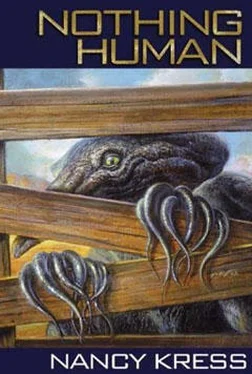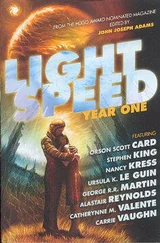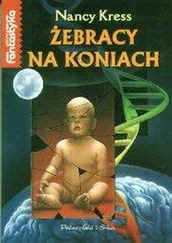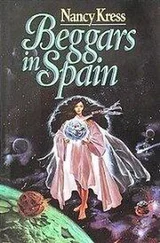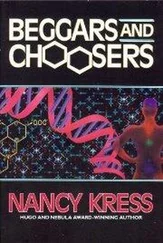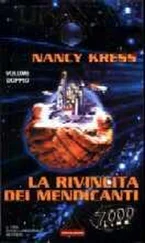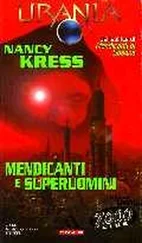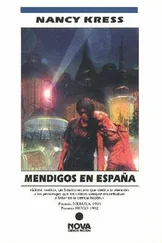“We wouldn’t hurt you!” Rhea said, shocked. She’d switched to smelling the concepts to Lillie, as all three children tended to do when emotional. “You’re our mommy!”
“But why didn’t it stop me?”
“We only aimed it at them,” Dion said.
A directed signal, like bats used for navigation. Lillie could understand that. Too high-pitched for her to hear, yes. Very loud, high sounds could cause enough pain to stop the men cold, make them fall down, and then —
Rhea, watching Lillie from gray gold-flecked eyes, said, “I made the defense poison, Mommy.”
Defense poison.
Dion said, “Don’t look like that, Mommy.”
Rhea smelled fearfully, “Are you mad at us?”
“No. No, I’m not. Those are bad men, they were going to kill Rhea―”
“Like Macbeth killed King Duncan,” Gaia said helpfully, and through her confusion and shock Lillie thought again what a heritage her children were getting, what a terrible jumble.
Gaia said, ”’ By the pricking of my thumbs, something wicked this way comes!’ It’s my turn to dig, Rhea.”
“I smell cookies,” Dion said. “Did you bring cookies?”
“Under the pines,” Lillie said, still shaky. Dion took off running. If the cookies were dirty from falling, it wouldn’t matter. The triplets could digest anything.
Rhea, the most thoughtful, said, “We need to dig a big hole to bury those bad people.”
“I’ll start the big hole,” Gaia said enthusiastically. “I like to dig.”
“Well, have a cookie first,” Rhea said.
Dion returned with the plate, its cookies covered with dried pine needles. The children ate eagerly. “Mommy, do you want one?” Gaia said.
“No, I… no, I don’t. I need to get out of the sun.” She retreated to the pine grove and lowered herself, trembling, to sit on the fragrant ground.
What were her children?
Not human, Emily had cried once. Once, twice, an infinity of times, from everyone who had stayed at the farm. A few minutes ago Gaia, Rhea, Dion had casually killed, without weapons, without contact. Now they sat gobbling sweets like any human children from any place, any time. They learned Shakespeare, history, algebra, their intellectual heritage. They played games with Raindrop and Theresa, Lillie’s grandchildren. They did their chores, sometimes grumbling, sometimes interested.
They had just casually killed three men. As casually as Alex or Loni killed game for dinner.
If they had to, if there was nothing else, would her children eat those three men for dinner? Why not? The men were another, lesser species.
No. Her children were human. The next step in humanity, yes, but human. What made them human was… was…
Eagerly Gaia began to dig a grave next to the three fallen bodies.
Not their genes. Not really. Everything on the planet shared the same DNA, base pairs and sugar phosphate spines and protein expression. Everything: bacteria and mesquite and gila monsters and Lillie. DNA didn’t make her children human; God knows what DNA they had in their genome, anyway. Pete and Pam could have put anything in there. Pam and Pete, who also shared this same DNA, and whom Lillie no longer considered human at all.
Intelligence? Did that make for being human? No. There could be—probably were —all sorts of alien beings out there who were highly intelligent (an oozing glob behind the ship’s garden wall, glimpsed for only a second…) Pam and Pete were intelligent, more so than Lillie, than Lillie’s children. Not intelligence.
Love? Even animals loved. Dogs, cats… . No. Too sentimental an answer.
Culture? Gaia could recite whole sections of Shakespeare. Rhea loved the abstract puzzles of geometry. Dion had begun to read Scott’s endless notes on genetics. But what if they couldn’t do those things? If they knew nothing at all of the vast human heritage, nothing, would that make them less human? No. Kalahari bushmen isolated and ignorant of the rest of the world were—had been —fully human.
Evolution, maybe. Gaia and Rhea and Dion were human because they were born of Lillie, who was born of Barbara, who if you went far enough back would end up sharing a common ancestor with apes, and that ancestor was certainly not human. One thing evolved into another, different thing.
Which was what was happening here, in front of her very eyes, with help from those who had already gone ahead, taking charge of their own evolution and so becoming something else in the process. Could you start a new race with only three people? Lillie vaguely remembered learning something about an “African Eve,” a single woman who had been the ancestor of everyone alive on Earth before the war. And Scott had told her once of a herd of feral English cattle that had had no new genes available to their tiny pool for over three hundred years, yet the herd had stayed healthy and growing.
And, of course, there might eventually be more than just Gaia, Rhea, and Dion to start this new race. The pribir had promised to return, and no one really knew what they could, or would, do next.
Maybe Emily and the others at the farm were right. Maybe Gaia and Rhea and Dion were not human. A new thought came to Lillie: Did it matter?
It was hard to accept.
How did you accept such rapid evolution, even if you yourself were causing it? Nations, states, villages had always had trouble accepting people who were “different.” Outsiders. Foreigners. But never before in history had the biological outsiders been your own children, so genetically different that you were watching your own extinction right before you, all at once, in an eyeblink.
Not human.
But still hers.
She got up off the ground to retrieve the discarded plate from the cookies, take it home, wash it, store it away for more sweets, another day, to give her children. They were digging earnestly, “conversing” with each other without sound, feeling the warm sun on bare heads; even Dion had lost his hat. None of them noticed Lillie leave.
But all of them would look for her when, tired and sweaty and satisfied, they made their way home.
“I believe that man will not merely endure; he will prevail.”
—William Faulkner
2083
Gaia emerged from the canyon, carrying an armful of prickly pear fruit she’d stripped off the cacti. Rhea loved juice wrung from the sweet, purplish fruit, and Gaia planned to pulp the pears and boil them into jelly for her sister. This was partly guilt; lately Gaia hadn’t been spending much time with Rhea or Dion. She didn’t know why, but more and more she wanted to go off alone to explore, to taste, to… what? Something. Now she was further from home than she’d ever been.
“I have immortal longings in me.” Uncle Scott had taught her that, before she could read it for herself. Gaia had loved the old man more than anyone else on Earth, except her mother. He had been so good. The good should never die.
She dumped the prickly pear fruit into a pile and pulled a stoppered earthen jar from her backpack, the only thing she wore except for her shorts. One by one, she squeezed the fruit above the jar, every motion quick and strong. A bit splashed back, onto the new breasts which had suddenly started swelling on her chest a few months ago. Impatiently Gaia wiped the juice off with her tentacles.
Someone was coming over the rise to her left.
Gaia immediately flattened, ready to retract into her shell, but just as quickly she rose again. Her gray, gold-flecked eyes widened.
A stranger. A boy. Like her cousins, but it wasn’t Stone or Raindrop. She smelled him advancing, not because he was sending her a greeting; he couldn’t do that. Rather, she smelled his body on the wind. Instantly, without volition, Gaia was smelling back to him.
Читать дальше
